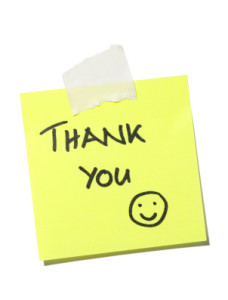Really, it seems too good to be true. If you heard about this in an email, you’d mark it as spam immediately. “You’ll feel better, make the people around you feel better, improve relationships at work and at home, and make people more likely to listen to you.” Sure…do you have a Nigerian millionaire’s estate to split with me, too?
The funny thing is, though, it’s real. Appreciation, given sincerely and consistently, does all that and more.
Before I say more about this, let me be clear about what I’m not talking about:
- Flattery. We can all tell when someone’s blowing sunshine up our skirts. It makes us feel manipulated, and besides, no one trusts a flatterer.
- The compliment sandwich. Have you ever known people who only say something nice when they have something negative to say? “Great work closing your cases this week…oh, by the way, if you don’t start attaching cover sheets to your TPS reports, you’re going to be in big trouble. Nice tie!” This isn’t very subtle, and appreciation from a compliment sandwich-maker leaves us wondering when the other shoe is going to drop.
- A grateful attitude. Don’t get me wrong; this is a great thing to cultivate. But when I’m talking about appreciation, I’m talking about a specific set of behaviors, not a mindset or attitude.
Appreciation is the act of telling those around you the attributes or behaviors they have that you like. For a coworker, this might be the fact that you can absolutely count on them to do what they say, or how their work makes your job easier, or how their positive approach just makes the office a nicer place.
Most of us notice these things, and we may even mention them to others. But how often do well tell the person we appreciate? Especially if we don’t do it frequently, it may feel awkward, or even somehow unprofessional. But practice makes it comfortable, and it’s perfectly professional when applied to workplace topics.
There are as many ways to express our appreciation as there are reasons to appreciate others. A quick face-to-face comment works, as can an email, or a post-it. If you’re inclined, home-baked cookies or veggies from the garden are nice, but really, this is a case where the communication is what counts.
Appreciation works best when it’s
- Specific—tell them exactly what you liked
- Timely—as they say, “if you see something, say something.” Now.
- Personal—say why they and their actions matter to you.
If people know you appreciate them and what they do, they’ll be happier to do more of it for you. They’ll know you value them, which means if you do need to have a difficult conversation, it’s based on mutual trust. And it really does feel good to see someone smile when you let them know what you appreciate.
Appreciation is an extremely powerful behavior to cultivate. Let’s all remind ourselves to do more of it.
(On that note, let me say how much Jennifer and I appreciate the fact that you’re actually reading this. It’s fun putting our experiences and observations in writing, but knowing that more and more people are reading it makes it really satisfying. Thank you!)
(HT to Beth Haggett, who developed the KCS Coaching workshop that got me thinking about appreciation in the first place.)

David – excellent article which got me thinking. There is, in my opinion, a difference between commendation, which is specific and event-related, and appreciation which is an overall cultural element of the organization or company. Consider this: we can commend our employees for their excellent work solving this case or handling that customer, but if corporate priorities cause them to be last in line for PC upgrades / IT support / training etc., then they will surely feel unappreciated. There’s actually quite a number of academic papers suggesting that employees treat customers as well as they feel treated by their companies, and praise, as important as it may be, can only take us part of the way there.
Haim
David,
Great post. I have been reading a lot about the power of thanking people frequently and in a timely manner, and have been trying to implement this in my daily work life. One of the first things I do in the morning is to take a moment to send a note to someone who has done something I appreciate.
Haim,
I have been trying to drive home this very point with my management at my company. Do you by chance have any citations or links for any of these academic papers you refer to?
thanks!
Linda